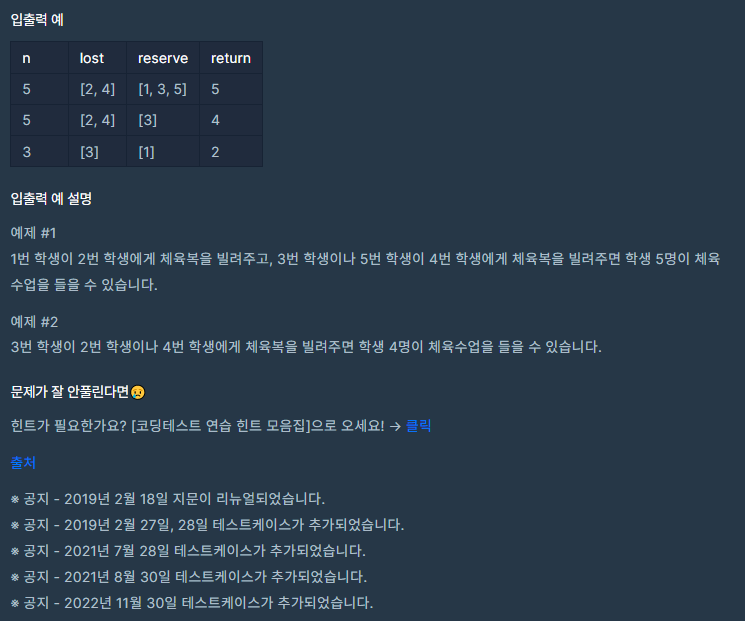티스토리 뷰
[문제]



[해설]
- 풀이법은 어느정도 접근했는데 결국엔 풀지 못 했다.()
- 다른 사람의 풀이를 참고한 내용을 올린다.(내 풀이를 어디다 적어놨었는데 그게 사라졌는지 못 찾았다.)
import java.util.HashSet;
import java.util.Arrays;
class Solution {
public int solution(int n, int[] lost, int[] reserve) {
Arrays.sort(lost);
Arrays.sort(reserve);
int answer = n - lost.length;
HashSet<Integer> cheUkBok = new HashSet<Integer>();
for(int i : reserve) cheUkBok.add(i);
for(int i = 0; i < lost.length; i++) {
if(cheUkBok.contains(lost[i])) {
answer++;
cheUkBok.remove(lost[i]);
lost[i] = -1;
}
}
for(int i = 0; i < lost.length; i++) {
if(cheUkBok.contains(lost[i] - 1)) {
answer++;
cheUkBok.remove(lost[i] - 1);
} else if(cheUkBok.contains(lost[i] + 1)) {
answer++;
cheUkBok.remove(lost[i] + 1);
}
}
return answer;
}
}
● Arrays.sort를 먼저 한 이유
- Greedy algorithm의 핵심은 최종 결과의 선택이 최선(최적) 일때 매 순간 선택 또한 최선(최적)이 되어야한다는 것이다.
- 매 순간의 선택 중 하나라도 최선(최적)이 아니라면 Greedy algorithm이라고 할 수 없다.
- 아래의 상황을 예로 생각해보자
n = 5
lost = [4, 2]
reserve = [3, 5]
cheUkBok = [3, 5]- 코드 없이 단순 눈으로만 계산하면 (4번 학생은 5번 학생)에게, (2번 학생은 3번 학생)에게 체육복을 빌릴 수 있다.
- 체육복을 잃어버린 학생들이 각각 자신의 뒷번호 학생에게 빌리면 되므로 이경우 (n = 5)가 된다.
- 하지만 코드는 그런 마음의 눈이 없다.
for(int i = 0; i < lost.length; i++) {
if(cheUkBok.contains(lost[i] - 1)) {
answer++;
cheUkBok.remove(lost[i] - 1);
} else if(cheUkBok.contains(lost[i] + 1)) {
answer++;
cheUkBok.remove(lost[i] + 1);
}
}- 만약 lost 배열이 정렬된 상태가 아니라면 (i = 0)일 때 아래의 결과로 if 문을 만족하게 된다.
if(cheUkBok.contains(lost[0] - 1)) = if(cheUkBok.contains(3)) --> true
cheUkBok.remove(3);
cheUkBok = [5];- 즉, 2번 학생이 3번 학생이 아닌 4번 학생에게 체육복을 빌리게 되는 것이다.
- 이 상태에서 (i = 1)일 때는 if 문을 아무것도 만족할 수 없게 되고 (n = 4)가 된다.
cheUkBok = [5];
if(cheUkBok.contains(lost[1] - 1)) = if(cheUkBok.contains(1)) --> false
if(cheUkBok.contains(lost[1] + 1)) = if(cheUkBok.contains(3)) --> false- (n = 5)가 최적의 답변인데 정렬을 하지 않으면 (n = 4)가 되므로 이는 문제의 답을 만족했다고 할 수 없다.
- 이러한 연유로 Arrays.sort를 먼저 해야한다.
● if(cheUkBok.contains(lost[i] - 1))를 if(cheUkBok.contains(lost[i] + 1)) 보다 먼저 비교한 이유
- 이것도 Arrays.sort를 먼저 한 이유와 비슷하다.
for(int i = 0; i < lost.length; i++) {
if(cheUkBok.contains(lost[i] - 1)) {
answer++;
cheUkBok.remove(lost[i] - 1);
} else if(cheUkBok.contains(lost[i] + 1)) {
answer++;
cheUkBok.remove(lost[i] + 1);
}
}n = 6
lost = [2, 4, 6]
reserve = [1, 3, 5]
cheUkBok = [1, 3, 5]- 위와 같은 조건이 주어졌을 때 코드 없이 단순 눈으로만 계산하면 (2번 학생은 1번 학생)에게, (4번 학생은 3번 학생)에게,
(6번 학생은 5번 학생)에게 체육복을 빌릴 수 있다.
- 따라서 (n = 6)이 된다.
- 이때 만약 아래와 같이 if(cheUkBok.contains(lost[i] + 1))를 먼저 비교했다고 해보자
for(int i = 0; i < lost.length; i++) {
if(cheUkBok.contains(lost[i] + 1)) {
answer++;
cheUkBok.remove(lost[i] + 1);
} else if(cheUkBok.contains(lost[i] - 1)) {
answer++;
cheUkBok.remove(lost[i] - 1);
}
}- 그러면 (2번 학생은 3번 학생)에게, (4번 학생은 5번 학생)에게 체육복을 빌릴 수 있지만 6번 학생은 체육복을 빌리지 못 하게 되므로 (n = 5)이 된다.
- 이러한 케이스가 있으므로 if(cheUkBok.contains(lost[i] - 1))를 먼저 비교해야한다.
cf) 아래 영상으로 Greedy algorithm을 먼저 공부했다.
'흥미 > 코딩테스트' 카테고리의 다른 글
| #24😂 달리기 경주 / indexOf는 시간복잡도가 많이 든다! (0) | 2023.04.16 |
|---|---|
| #23😊 추억 점수 (0) | 2023.04.04 |
| #21 😊 프로그래머스 - 콜라 문제(Level 1) with 재귀함수 (0) | 2023.03.16 |
| #20 😂 프로그래머스 - 카드 뭉치(Level 1) / Queue 사용해보기 (1) | 2023.03.15 |
| 😒 #19 프로그래머스 - 삼총사(Level 1) (0) | 2023.03.11 |
- Total
- Today
- Yesterday
- node.js
- 프로그래머스
- MySQL
- 메모리
- Advanced Stream
- nosql
- Java8
- 프로세스
- git
- 빅데이터
- Stream
- 알고리즘
- spring
- OS
- Spring Boot
- 코딩테스트
- 운영체제
- DART
- 빅데이터 분석기사
- 자료구조
- MongoDB
- 코테
- SQL
- API
- db
- SpringBoot
- Phaser3
- java
- Phaser
- jpa
| 일 | 월 | 화 | 수 | 목 | 금 | 토 |
|---|---|---|---|---|---|---|
| 1 | 2 | 3 | 4 | 5 | 6 | 7 |
| 8 | 9 | 10 | 11 | 12 | 13 | 14 |
| 15 | 16 | 17 | 18 | 19 | 20 | 21 |
| 22 | 23 | 24 | 25 | 26 | 27 | 28 |
